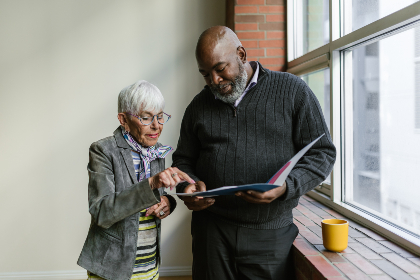May 17, 2022 by
Janet L. Essman Franz
This Q&A with Holly and Bob Miller Chair in Memory and Aging Michael LaMantia, M.D. M.P.H., associate professor of medicine and chief of geriatrics, is featured in honor of Older Americans Month, and was excerpted from his "Ask The Expert" session held during the April 2022 Vermont Geriatrics Conference.

An older woman (left) and man look at a document together, as the woman points to something on the page. (Pexels stock photo by Rodnae Productions)
May 2022 marks the 59th anniversary of Older Americans Month, established by the U.S. Department of Health and Human Services Administration for Community Living "to acknowledge the contributions of past and current older persons to our country."
In April, healthcare professionals from across Vermont gathered for the Vermont Geriatrics Conference in Burlington, Vt. Presented by the University of Vermont Center on Aging, this annual conference provides the latest information on clinical care and supports education and skills development to improve care for older patients.
"Participants love this conference because it provides an opportunity to network and exchange ideas and information with colleagues," said course director Isaura Menzies, M.D., MPH, associate professor of medicine in the Division of Geriatrics.
In a keynote address on fall prevention, Nancy Gell, Ph.D., associate professor of rehabilitation and movement science at UVM's College of Nursing and Health Sciences, coached participants in a self-assessment of their fall risk, asking the entire audience to stand up to complete timed tandem walking and one-leg standing maneuvers. A panel discussion on mental health included representatives from AgeWell, Support and Services at Home (SASH), the Veterans Administration, and providers whose practices integrate primary care with psychiatry. Afternoon sessions ran concurrently, offering workshops and small group discussions on Medicare wellness visits and treating anxiety and depression among older people.
For the first time, the conference offered a creative teaching session called “Ask the Expert.” Dr. Menzies hosted, using audience-generated questions to query Holly and Bob Miller Chair in Memory and Aging Michael LaMantia, M.D. M.P.H., associate professor of medicine, chief of geriatrics, and a specialist in cognitive impairment.
Following is an excerpt from the Ask The Expert session.
Q: Should primary care providers make a diagnosis of dementia in the office?
A: Diagnoses of dementia can be made in the office through history reported by a close informant who has observed cognitive decline over a specific period of time, along with completing a cognitive screen. The literature has informed us that 85 percent of patients are diagnosed by a non-dementia specialist and 36 percent of patients saw a dementia specialist within five years of diagnosis. There are some patients who, because of younger age and abrupt cognitive decline, would benefit from a referral to the memory center for further evaluation and neuropsychiatric testing. A neuropsychiatric test includes a battery of tests of cognition completed over a few hours.
Q: What is a useful and feasible cognitive screening test to do in the office?
A: The easiest and fastest test to administer is the Vermont Mini Cog. It tests memory and executive function and can be completed in five minutes or less. Another test, the Mini-Mental State Exam, is also useful and can be completed in 10 minutes. A diagnosis of dementia is made when a person has a deficit in one domain of cognition and the deficit is affecting their personal care and daily functioning. Additionally, the deficits do not occur exclusively during an episode of delirium and they are not explained more fully by another medical condition.
Q: Is there a good way and a bad way to deliver a diagnosis of dementia to a patient?
A: There are most certainly good and bad ways to tell someone that they have dementia. If I had my way, I would set up an office visit for the sole purpose of delivering the diagnosis. This dedicated visit would allow time to answer the patient’s questions, share resources for dementia care that if not needed at the time may be needed in the future, and demonstrate compassion and commitment to the patient.